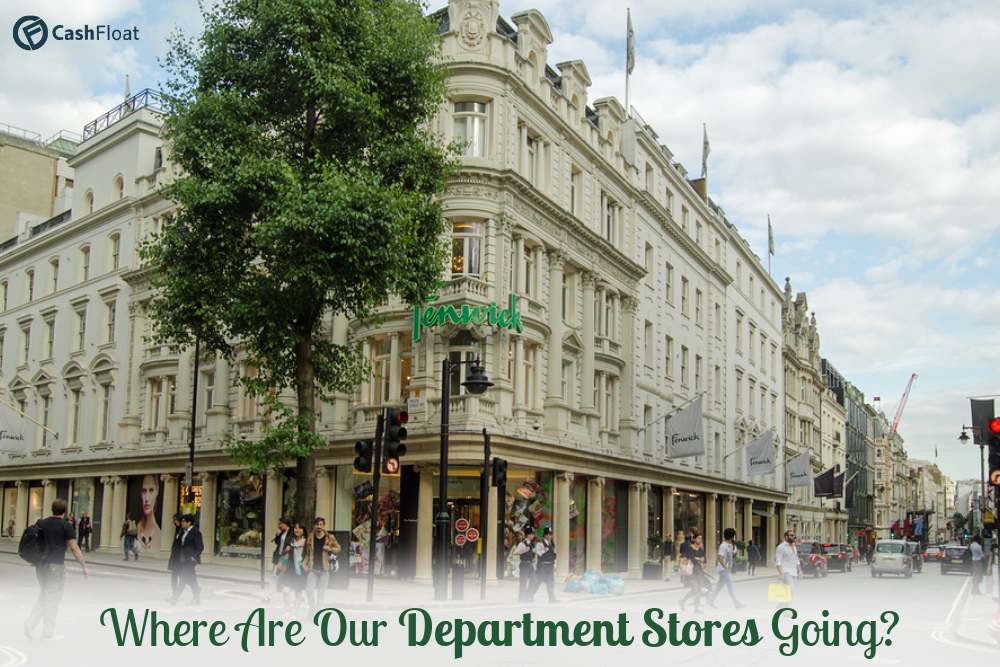Discover the reasons behind the slowly disappearing department stores in the UK. Read on with Cashfloat and learn about how Fenwick are cutting back in a feat to try and save themselves.

- The changes Fenwicks has announced
- To what extent other department stores are struggling financially
- Why UK department stores are in decline – changes in Britons’ shopping habits; changes in spending habits; soaring business costs; stagnant wage increases; poor management & lack of innovation
- Conclusion – The future of department stores
The news that Fenwick department store is restructuring and making 12% of its workforce redundant is the latest in a long line of British chain stores which have shown signs of financial difficulties. In this article, we explore the extent of the problem and attempt to explain why, before considering whether we can do anything to stop this trend. Are the days of nationwide department stores in the UK numbered?
What Changes Have Been Announced by Fenwick?
Fenwick had been showing signs of trouble since its accounts to January 2018 revealed that its gross sales had dropped by £15 million to £411 million while its like-for-like sales had also fallen by 2.6%. After closing stores in both Leicester and Windsor, it embarked on a 4-month consultation with staff. The result has been that 408 members of staff have been made redundant, two-thirds of whom agreed to take voluntary redundancy.
The restructuring programme will entail many back house office roles being moved from individual branches, and their Newcastle branch playing an increasingly important role in the shake-up. All Human Resources, company secretarial work, IT services and legal teams will now be centrally located in this flagship store while the buying teams for general merchandise and home furniture will also be transferred to the North-East.

To What Extent are Other Department Stores Struggling Financially?
Fenwick isn’t unique in the problems they have been facing. The disappearance of BHS in 2016 with the loss of 11,000 jobs, the announcement of the closure of 100 branches of M&S by 2022 and the closure of 31 House of Fraser branches (with the loss of 6,000 job positions) are just a few of the changes to affect department stores across the whole of the country and which have transformed British High Streets.
Generally, British retailers are in trouble. The number of FTSE-listed British retailers which have issued profit warnings has reached epidemic proportions. So far, nearly 40% have issued profit warnings in 2018. We have not had this scale of financial distress since the financial crisis of 2008.
Why Are UK Department Stores in Decline?
There are a variety of reasons to explain why department stores across the whole of the UK are facing financial problems. Let’s take a closer look.

Changes in Britons’ Shopping Habits
Changes in Spending Habits
Soaring Business Costss
Stagnant Wage Increases
Poor Management & Lack of Innovation
One of the key attractions of department stores used to be the convenience of buying a variety of products under one roof. This advantage was first challenged by the opening of more and more out-of-town shopping centres from the 1980s onwards.
However, the biggest threat came with the advent of the internet. Britons now use the internet for an estimated fifth of their retail spending. This trend is part of the general decline in the importance of British High Streets, partly fuelled by shoppers’ difficulties in finding parking and paying the charges. As a result, stores can no longer rely on residents regularly visiting the area and therefore, pulling in passing trade.
Research has shown that Britons are also changing what they spend their money on even though there has still been an increase in quick online loan applications. Visa has stated that people have reduced their spending on clothing and household goods while Barclaycard has seen a 10% increase in spending on entertainment. These changes have of course hit department stores hard.
Many local authorities have to increase their business rates because of cuts in central government funding. Department stores have been especially hard hit by rising business rates purely because of the size of their stores. Many of their buildings are under 30-50-year-old leases and also need extensive maintenance because of their age.
Apart from increased taxes, department stores have been hit by increases in the money needed to cover staff salaries. Not because of wage rises but because of legislation covering the payment of a minimum wage.

UK wage rises average 2% at a time when inflation is around 2.4%. This effectively means that Britons’ income has fallen in real terms. This factor has been made worse by other changes like zero hour contracts and increases in the numbers of self-employed. People have to make sure that they pay their priority debts even if it means requiring an instant payday loan, so it’s obvious that they’ll have less to spend on non-essential goods from department stores.
People have criticised many department stores for their reluctance to invest and upgrade their branches. The same shop floors, product ranges and displays don’t give shoppers an incentive to spend money. Even tactics like discounting products are a tired gimmick used by all stores so it becomes a race to the bottom and cuts into their profit margins.
The biggest mistake that many department stores have made, however, has been not to increase their online presence. It might seem unbelievable, but Fenwick doesn’t have a website. As part of their restructuring programme, they are planning to pilot their new website in October 2018 so it’s fully operational in early 2019. When you consider that 50% of the £4 billion in sales of the fashion outlet ‘Next’ are made online, it becomes apparent that Fenwick had missed a golden opportunity by not having an online presence sooner.
Conclusion – the Future of Department Stores
The future of department stores might lie in combining the best of both retail experiences: customer service offered by in-branch visits with the convenience of online shopping. The future might be the creation of ‘brick and click’ stores, but this would require innovation and investment in digital technology and the possible relocation of stores to smaller buildings. The main benefit of downsizing is that department stores will also be able to make savings on their running costs and staff wages. For these reasons, we shouldn’t write off department stores just yet.


